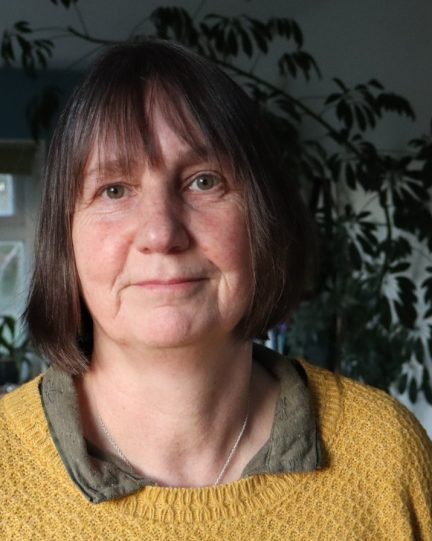Counselling for individuals and couples in West Yorkshire: Huddersfield, Marsden and Halifax
My name is Deb Whittle (she/her) and I am a BACP accredited counsellor based in Marsden. I have 29 years counselling experience, working with individuals, couples and young people in the Huddersfield, Halifax and Marsden areas. During this time I have also worked for MIND- the leading mental health charity, in Dewsbury for 10 years where I worked with people with a range of enduring mental health problems and also for Tameside Youth Offending Team, mainly with 11-18 year olds and their families. I have been accredited with the BACP since 2003 and work to their ethical framework. In addition I am also a qualified supervisor, offering counselling supervision and personal therapy to counsellors in training (discount available).
My Approach
My main theoretical approach is person-centered, which means that the therapy is non-directive, using respect and empathy to build a therapeutic relationship within which my clients can safely explore difficult areas of their lives either past or present, in a confidential and non-judgemental environment
My approach is also informed by Transactional Analysis and attachment theories depending on individual client need, or the needs of a couple.
- 1997: Diploma in Counselling
- 2000: Postgraduate Certificate in Supervision of Therapeutic Relationships
- BACP Accredited 2003: www.bacp.co.uk
- 2024: Pregnancy and Infant loss Practitioner Training through the Foundation for Infant Loss
- Dr Sue Johnson's Intensive Course in Emotionally Focussed Therapy for Couples 2025/2026
Identity issues, relationship difficulties, bereavement, childhood trauma, depression, anxiety.
Everyone experiences times when life seems to lose its meaning. Memories from the past, painful and difficult events in the present and worries about the future can all make it hard to cope with everyday life, often impacting on relationships.
The past four years have been extremely difficult for many people, struggling with bereavement, long-Covid, increased anxiety, depression and loneliness and speaking with a counsellor may help to process and alleviate some of these feelings and lessen the sense of isolation.
The lockdowns also put couples relationships under tremendous strain and deciding to embark on some couples counselling can help to identify issues and work through them in a safe, neutral environment.
What issues can counselling help with?
If you are struggling with issues, then this will impact on your health and well - being and there may be times when appropriate support cannot be found from family, friends or colleagues. Talking over the issues with a professional counsellor can often help, taking away some of the weight you carry. I can offer you counselling on a wide range of issues including;
Anxiety
Depression
Bereavement
Couples counselling (heterosexual and same-sex)
Childhood sexual abuse
Work-related stress
Stress management
Anger management
Sexual/gender identity
And more
If you're dealing with feelings of depression and anxiety or are struggling to cope following a bereavement or experiencing problems within your relationship, please do give me a ring today to make an appointment or contact me using the confidential enquiry form on this website and I can support you through this time by offering a safe space to explore these difficulties.
Tackling problems before they get out of hand can help to improve communication with loved ones and strengthen bonds.
My location
I work as a counsellor from a purpose-built, comfortable building based in Marsden with good transport links to Huddersfield, Oldham and Halifax. There is off-road parking and I can offer either short or long-term counselling dependent on your need. So whether you live locally in West Yorkshire in the Huddersfield or Halifax areas or further afield please contact me either by phone or email to arrange an appointment.
My room is a good size and has plenty of ventilation. If you are worried about Covid19, please do contact me to discuss your concerns so that we can work together safely. There is a small step into the room and the door is wide enough to accommodate a wheelchair.
Fees & availability
Individuals: £50.00 per 1 hour session
Couples: £50.00 per 1 hour session
Supervision: £55 per 1 hour session
Fees are payable at the end of the session or by invoice.
At least 48 hours notice will be required if you need to cancel a session or the full fee will be payable.
Please note that I am available for day-time appointments only.
Get in touch
Feel free to contact me if you have any questions about how counselling works, or to arrange an initial assessment appointment. This enables us to discuss the reasons you are thinking of coming to counselling, whether it could be helpful for you and whether I am the right therapist to help.
You can also call me on my mobile at 07729237628 if you would prefer to leave a message or speak to me first. I am happy to discuss any queries or questions you may have prior to arranging an initial appointment.
If I am unavailable to answer when you call, please leave your name, contact number and if possible, a convenient time for me to call you back.

